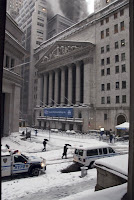In a craft made out of willow reeds
under grey skies, clouds opaque
we sailed upon new spring waves
an equinotical vernal date
Our souls together thus were borne
on drafts of wind unseen
warmed by love and innocence
in the temperate seas of spring
I thought if I could catch it then
in words I could express
I could give it to you endlessly
but its essence would not be etched
We float instead, past flotsam memories
past old Riley, with his rake
past crumbling limestone yesterdays
and garden lives that once were great
Past growing things and summer vows
in a garden, in a church
in the seedings and the rootings
pasts and presents are converged
We float across the yellow green
then forsythia waves of gold
and see rich jeweled islands cobalted blue
just emerged from winter's cold
There, a flock of new magnolias
perched on a twisted old green fence
poise their pink wings to fly away
perfumed and intense
The lockers locks de-iced
hyberbation thawed
there’s a leaping of our hearts
a joy that winter stalled
Shedding hats and gloves and woolen coats
back to our new selves underneath
we smell the smell of leather gloves
then our selves are more complete
A parrot green with eyes of orange
has a key now in his beak
to a safe that holds a telescope
to see things once oblique
A squinted eye held to the scope
old dolls lost are seen again,
pony tails and pink ribbons
reunited childhood friends
There’s your birthday dress,
with its ruffled top, mom put it on your bed
your friends are coming over soon
for spring happiness again
Do you see your favorite album?
it’s fifties, no it’s rock
it’s Simon and it’s Garfunkel
it’s Cowsill family pop
Now a shimmering spirit
a soothing birthday potion
from dandelions and cherry blossoms
bittersweet and potent
We slip into Jacob's forest now
a shadowed Sherwood in her backyard
to sneak in and make a real faux camp
I’ll give you a head start
We’ll see cardinals, larks and blue jays
as they dance around the trees
disappointments don’t exist there
only inner peace
Squirrels, raccoons and grapevines
tea parties, rabbit holes
you’re alice in her looking glass
watching mysteries of the soul
The captain sends you to the crow’s nest
to spy for trains down at the corner
we close our eyes and listen
from you, our sole reporter
It’s the soothing of the railroad sounds
steaming brakes and clanking steel
cityscapes and city sounds
iron ships without a keel
You spy the station wagon
in the driveway, an old ford
In 70’s rides you saw the police
until the Wright’s they were ignored
I see you on your birthday then
and you’re tender, young and pretty
you’re holding your little sisters’ hands
If it’s not like this now then you’ve just made things up
in the intervening years
spring is always out there
and won’t ever disappear
Like how I saw you in the kitchen
with all your still best friends
bell bottoms, beads and peace signs
none have ever reached an end
And in places there on Bell and Hoyne
you’re still holding hands with the girls
but your hands to hold have multiplied
like sparkling family pearls
Our ship lifted off and took to the sky
its great white sails unfurled
our captain pointed to a southern point
and gave the wheel a twirl
We moved up through the giant oaks
toward their ancient towering arms
they protected all our growing up
and kept us all unharmed
We sailed then almost aimlessly
we turned and lurched and twisted
as the captain threw the anchor out
I thought we almost missed it
But we floated up there in the sky
and I recognized the space
a sacred mission, a sacred heart
a childhood holy place
You looked down through your telescope
and saw yourself down there
white gloves and white dress
spring flowers in your hair
And you felt it then and you feel it now
with borchardt in the garden
and the next one there that would heal your soul
when you needed that department
We waved at you and you looked up
and the sailboat lifted us together
and the spring songs floated up to us
and they’ll be with us for - forever
 This is my third year of writing a Thanksgiving Day post.
This is my third year of writing a Thanksgiving Day post. - For finally meeting young Kalven
- For finally meeting young Kalven






























